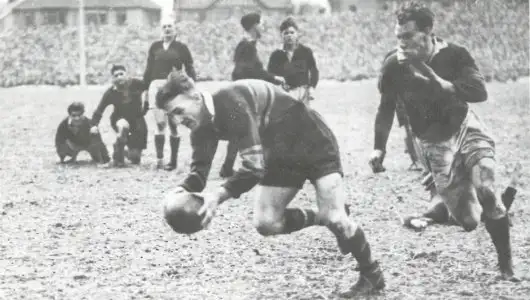Frank Watson passes away

Former Hunslet and Leeds player Frank Watson has passed away at the age of 93.
Born in January, 1923, Frank Watson was the oldest surviving former Leeds player.
Known as Shanks, he was from south of the river and joined Hunslet as a 17-year-old in September, 1940.
Though he could play anywhere in the backs, he was primarily a scrum-half.
Called for a Great Britain trial in 1946, he famously worked a night shift as a bus conductor, rushed to Central Park, Wigan, to play in the match, then returned straight to Leeds to go back on another all-night shift.
When he lost his position at scrum-half, he shifted to centre and Leeds saw their chance, swooping to sign him in September, 1949. His debut was against Hunslet at Parkside just two days later.
The first many fans knew of the move was when Watson jogged out wearing blue and amber. Watson starred for Leeds for two years before his place was taken by Jeff Stevenson.
Frank was a Hunslet Schools’ player who began his Hunslet career when he signed on in September 1940 and played Leeds in the Lazenby Cup.
In his 10 years with Hunslet, mainly at scrum half or half back, he played 246 times, scoring 57 tries and 1 goal and setting up many more tries.
In his benefit year, which he shared with Sid Rookes, Sammy Newbound and Walter Burnell, he was given £350, a substantial amount in the early 1950s.
When he had signed on, he had been given £10 with promise of a remaining £90 to be paid “at the end of hostilities
He grew up in Hunslet and attended Hunslet National School and lived in Church Street before slum clearance took his family to Windmill Road in Belle Isle.
From there he would go to training before going on to his night shift for the council.
When he became old enough for conscription into the army during the war, his call-up was deferred as his mother had to cope with the illness of his three brothers due to the debilitating disease, Muscular Dystrophy.
When Hunslet shut down for the 1942-3 season, Frank guested with York before returning for the 1943-4 season where he was making a name for himself as a “sound and competent” player.
By the late 40s he was playing for Yorkshire and in October 1947 had played in the match when Hunslet beat the touring New Zealanders, 18 – 10.
Still playing well and only 27, he was stunned to discover in September 1949 that Leeds wanted him and that Hunslet had put up no objections and 3 days later, on Saturday, 1 Oct, Shanks pulled on the colours of Leeds and ran out onto the Hunslet pitch to help beat his old team 21 – 13.
Not only did he not want to leave Hunslet, it seemed that most of the fans didn’t want him to leave and there were reports of angry protests against the Hunslet directors.
The newspapers had headlines such as “Hunslet sold Leeds match winner of this local derby.”
Shanks played for Leeds for several years before becoming their A Team player/coach, coaching amongst others the author, David Storey, who wrote “This Sporting Life,” later made into a famous film.
Shanks played his last game for the Leeds first team on 8 Oct 1955. Later, he went to Batley for two seasons as a coach of the A Team, but he played in the first team too.
In 1959, aged 36 years,he retired from rugby league. He had only had one serious injury to keep him out of the game.
That was a broken right ankle sustained in 1951 when playing for Leeds. He had played in four Challenge Cup semi-finals but never got to Wembley as a player.
He went on to make 122 appearances for the Leeds and had the Heritage number 864.
Our thoughts are with his friends and family at this time. The club will pay tribute to Frank with a minute’s silence when the Rhinos take on Batley this Friday at Headingley.